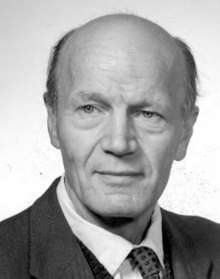Werner Romberg
Werner Romberg (born 16 May 1909 in Berlin; died 5 February 2003 in Heidelberg) was a German mathematician and physicist.
Werner Romberg | |
|---|---|
 | |
| Born | 16 May 1909 |
| Died | 5 February 2003 (aged 93) Heidelberg, Federal Republic of Germany |
| Nationality | Germany Norway |
| Alma mater | Munich University |
| Known for | Romberg's method |
| Scientific career | |
| Fields | Mathematics Physics |
| Institutions | University of Oslo Technical University of Trondheim Heidelberg University |
| Doctoral advisor | Arnold Sommerfeld |
Romberg studied mathematics and physics form 1928 in Heidelberg and Munich and completed his doctorate in 1933 at Munich University under the supervision of Arnold Sommerfeld; his thesis was entitled "Zur Polarisation des Kanalstrahllichtes" ["On the polarisation of channel light beams"]. In Munich he studied mathematics under, among others, Oskar Perron and Constantin Carathéodory. In 1933, as a so-called "half-Jew" in the terminology of the new National Socialist government of Germany, he sought to emigrate to the Soviet Union. From 1934 to 1937 he worked as a theoretical physicist in the University of Dnipro (then Dnipropetrovsk). In 1938 he went, via the Institute for Astrophysics in Prague, to Norway, where he became an assistant to Egil Hylleraas at the University of Oslo. He also briefly worked at the Technical University of Trondheim with Johan Holtsmark, who was building a Van de Graaff generator there. With the German occupation of Norway he fled to Uppsala in Sweden. In 1941 the Nazi German state stripped him of his German citizenship, and in 1943 recognition of his doctorate was revoked. He became a Norwegian citizen in 1947.[1]
After the Second World War, from 1949 to 1968, he was a Professor in Trondheim; from 1960 he was head of the applied mathematics department. In Norway he built up his research group in numerical analysis, and part of the introduction of digital computers, such as GIER, the first computer at Trondheim. From 1968 he held the Chair for Mathematical Methods in Natural Sciences and Numerics at Heidelberg University.
See also
References
- B. Owren, Kongelige Norske Videnskapers Selskap Skrifter 4, 149-155 (2011).
- Stefanie Harrecker: Degradierte Doktoren : die Aberkennung der Doktorwürde an der Ludwig-Maximilians-Universität München während der Zeit des Nationalsozialismus, München : Utz, 2007 ISBN 978-3-8316-0691-7. Kurzbio S. 346
- Claude Brezinski, Some pioneers of extrapolation methods, in Adhemar Bultheel, Ronald Cools (Hrsg.), The birth of numerical analysis, World Scientific 2010, S. 10 (Biographie)